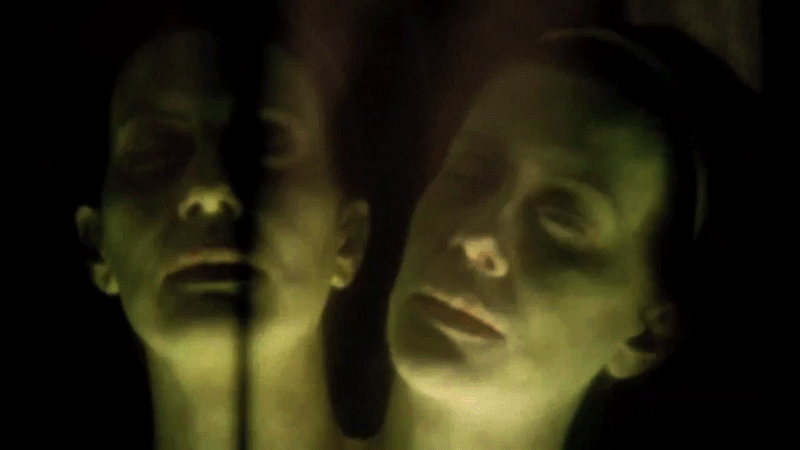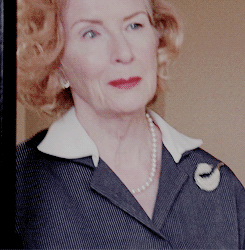Everyone has a dream on Freakshow, and it’s never been made more apparent than on this week’s “Pink Cupcakes.”
The episode opens with Stanley’s dream, or vision, in which he and Maggie are guests at an unveiling event at America’s Morbidity Museum. After expressing disgust for not being the honorary guest, Stanley watches the curator introduce the guest while simultaneously unveiling his contribution to the museum – Paul the Illustrated Seal confined in water-filled glass container. The audience is both shocked and positively amazed at the man’s donation. Amongst the audience’s praise, you can almost hear Stanley’s thoughts: “It should be me.”
This isn’t the only vision of Stanley’s we’re privy to this week. We are later taken back to the same museum where Stanley unveils his contribution to the curator – Dot and Bette’s conjoined heads, their bodies severed just below the clavicle. The curator displays immediate astonishment accompanied by a deep gasp of awe while simultaneously cracking a smile at the creature before her eyes. Curious about how they ended up here, the curator inquires about the twins and Stanley states they died when one of them, Bette, developed a cough which later subsumed Dot. Stanley’s story is juxtaposed with images of feeding Bette a poison-filled pink cupcake, and smothering Dot while her sister succumbs to the poison beside her. These visions show just how far Stanley is willing to go in order to be recognized by others – recognized as the one capable of bringing to spectators something truly unique and alien.
 Even though Stanley is the only character whose visions we are witnesses to doesn’t meant the other characters’ dreams aren’t as vivid. On the peripheral we have Dot and Bette dreaming of a new life – Bette craving the fame and lifestyle of the celebrities gracing the pages of her magazines, while Dot simply dreams of a life without Bette, evidenced by her own visions we’ve seen in a previous episode. Dell dreams of not only embracing his gay lifestyle, but wishes to be the sole provider and caretaker of Matt Bomer’s promiscuous Andy. Not one to be confined to the lifestyle described by Dell, Andy has his own dream of doing portraits under the bridges in L.A. where he no longer has to prostitute himself and clean his bloodied undies. On the other hand (no pun intended), Jimmy longs for a true romantic connection ideally with Maggie, but ends up setting for the emotionally vulnerable Desiree.
Even though Stanley is the only character whose visions we are witnesses to doesn’t meant the other characters’ dreams aren’t as vivid. On the peripheral we have Dot and Bette dreaming of a new life – Bette craving the fame and lifestyle of the celebrities gracing the pages of her magazines, while Dot simply dreams of a life without Bette, evidenced by her own visions we’ve seen in a previous episode. Dell dreams of not only embracing his gay lifestyle, but wishes to be the sole provider and caretaker of Matt Bomer’s promiscuous Andy. Not one to be confined to the lifestyle described by Dell, Andy has his own dream of doing portraits under the bridges in L.A. where he no longer has to prostitute himself and clean his bloodied undies. On the other hand (no pun intended), Jimmy longs for a true romantic connection ideally with Maggie, but ends up setting for the emotionally vulnerable Desiree.
Desiree received some much needed development this week when we explored the inner workings of her own dreams. After unexpectedly suffering a miscarriage, Ethel takes her to the see the doctor she saw in “Edward Mordrake Part I.” The doctors provides Desiree with both good and bad news: the bad news being, of course, the miscarriage, but it’s immediately followed with the more fortunate revelation that not only can she bear children but is also 100% woman – her penis not a penis at all, but an enlarged clitoris the result of excessive testosterone present at birth. After she gets the news, Desiree tells Dell she is both peacing out on their “sham” marriage, and also has plans of being a wife and mother capable of walking down the street.
Elsa continues her failed campaign to become a star, at first outright denying Stanley’s “offer” of being on television, saying she would rather be “boiled in oil” (foreshadowing, perhaps?). After a truly horrendously dull performance of “Life on Mars,” Elsa reconsiders and accepts Stanley’s proposal. Like Stanley, Elsa is determined to achieve her dreams at whatever cost. When she sees Stanley escorting Dot and Bette to an undisclosed location for a picnic (a poison cupcake picnic, mind you), Elsa is once again threatened by the elusive twins. When the twins return from the picnic – alive and well, because Dot correctly points out cupcakes are no way to achieve a celebrity’s body – Elsa enters their tent and states she, too, is getting a television show but will be the twins’ mentor at Stanley’s request. Elsa lures the twins on a trip under the false pretense of shopping (very smart, Elsa), but it appears she’s dropping them off at Gloria Mott’s mansion, remembering how desperately Dandy wanted to take them home for his own amusement. No one said achieving dreams had to be done pleasantly or fairly.
Up until this point, it would seem the common thread running through each of our characters is their status as a “freak.” However, it is the desperate motivation at achieving their innermost dreams that makes them most similar. Each of their dreams isn’t merely an instance of individual achievement, but to feel as though they’ve “made it” requires an audience – an other. Stanley not only wants to see the surprise and disbelief on his audiences’ faces when presenting his “creatures,” but he wants to experience it as well. Elsa doesn’t simply want to put on a good performance, she wants to feel the audience as she performs. Desiree’s fantasy doesn’t involve being a wife and mother within the solitude of a home, but her dream involves walking down the street so others can experience her as a wife and mother. Jimmy’s advances on Maggie aren’t superficial attempts similar to his experiences with the desperate housewives we witnessed in the first episode, but rather he’s genuinely seeking a romantic connection they can both experience.
In other words, what they are seeking is what John Shotter would call a “real presence,” which he describes as
“[S]omething very special that occurs only when we enter into mutually responsive, dialogically structured, living, embodied relations with an other or otherness in our surroundings – when we cease to set ourselves, unresponsively, at a distance from them and allow ourselves to enter into an interinvolvement with them” (p. 274).”
The key word in the above description is “dialogic” – the Bakhtinian concept. I have briefly described the concept before, as opposed to the closed-off, static monologic. For Shotter, real presences only occur, borrowing from Bakhtin, in the dialogical realm because “both [people] act in the responsive present of the other … they do this straightaway, bodily, in a ‘living’ way, without having first to work out how to respond with each other” (p. 279). Experiencing a real presence is not something individual, but rather a “jointly constituted activity, [where] none of our actions are truly yours or mine alone; they are ours” (p. 279).
What our Freak Show characters ultimately long for is a real presence, where their actions are not individually their own – Stanley’s contributions are not merely for himself, Elsa’s performances do not wholly belong to her, and Desiree’s wife/mother status is not discrete – but part of a much larger collective activity. But, as Shotter contends, real presences – as a result of being part of the dialogic space – lack specificity and finality. Because our characters can never specify exactly what it is they are after, or linguistically capture it when they achieve a fleeting glance (the ultimate hurdle of dreams), the ultimate tragedy lies in never being able to accomplish a completely finished product.
We can see hints of how dangerous this non-specificity and non-finality can be: Elsa is willing to take Dot and Bette to their death, for all she knows, by dropping them off at the Motts’. But a more severe example exists with Dandy. After getting a taste of a real presence by murdering Dora last week, Dandy is on a mission to get back that feeling. Not only does Dandy mutilate (and possibly kill) Andy, but he disposes of Andy’s limbs by submerging them in acid, thereby erasing any evidence the act ever existed. By obliterating any proof the act took place, Dandy can successfully move on to the next victim hoping to achieve the same primordial, real presence he did with Dora.
Freak Show continues to defy the pace of previous seasons by moving slowly but distinctly through the story. The effect is a much more disturbing and creepy tale, where each character is shown as harboring deeply unsettling motivations – ultimately the result of prolonged frustration and rejection.
Other Stuff I Didn’t Mention But Wanted To:
- Frances Conroy’s Gloria Mott might be a secondary character, but she steals every scene with such panache. She is capable of being humorous (e.g., justifying a 12-ft hole for Dora’s body by telling the landscapers the bulbs she wanted to plant were from Holland), sympathetic (e.g., her conversation on the phone with Dora’s daughter asking how she was as a mother), and horrified (e.g., finding Dora’s body, and later when a blood-drenched Dandy comes home to greet her).
- Speaking of Gloria and Dandy’s relationship, Gloria makes a passing remark when she fears Dandy’s “extracurricular” interests might be the result of incest. She says something along the lines of “these afflictions are common amongst the wealthy” due to “cousins sleeping with cousins” in order to keep the wealth within the family. In the previews for next week, the subject is broached again. There was a distinct interest in Dandy’s father, and I’m wondering if this is foreshadowing for the next season? My other thought was Asylum’s “Bloody Face” is somehow a descendant of Dandy/Dandy’s father.
- I know I didn’t focus too much on Dandy in this post, but his character is getting more engaging every week. It was interesting to learn his original plans of being an actor not only didn’t come to fruition, but he blames his mother for not making it. The scene of him working out in his tightie-whities was extremely Bateman-esque and maybe one of the best scenes of the entire episode.
Works Cited:
Shotter, J. (2006). Creating real presences: Displays in liminal words. In L.J. Prelli (Ed.), Rhetorics of display (273-289). Columbia, SC: University of South Carolina Press.









